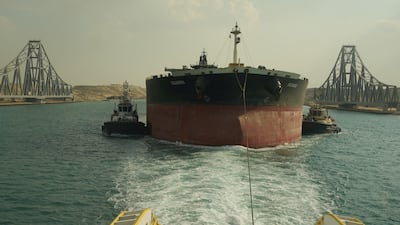Larry Summers, who was US Treasury secretary in Bill Clinton’s administration, has a sharp tongue and a very sharp mind. Mr Summers has been reflecting on US President Donald Trump’s on-off-on-again tariff policies.
The latest extraordinary twist is suddenly to exempt Chinese-made smartphones and computers, products much loved by US consumers and hugely important for Apple, Dell and other US importers. But what, you may wonder, is the point of tariffs if the most important imports from Mr Trump’s key target country – China – are suddenly exempted?
It’s supposedly a “temporary” exemption, but as Mr Summers said of Mr Trump’s various flip-flops: “I suspect the [Trump] administration stepped back because it saw a Suez moment approaching, with general lack of confidence in US financial assets spreading to the dollar.”
Suez is a damning historical parallel. It was a self-inflicted disaster in which delusions of imperial power in Britain and France were finally shattered by reality.
In 1956, the British and French governments colluded with Israel to invade Egypt and seize the Suez Canal. They were forced to leave when the US (and most of the rest of the world) saw the military adventure as last-gasp imperial arrogance from two fading European nations with delusions of grandeur. Those European countries that once proverbially ruled “half the world” suddenly appeared more like middle-sized powers that had made a profound geostrategic gamble, and lost.
Mr Summers may, therefore, be astute in seeing this as a “Suez moment” not just for Mr Trump, but for the US itself. Are we witnessing a great power significantly overplaying its hand, embarrassing its friends and allies, and eventually being forced to retreat?
Predictions about Mr Trump’s next moves are a fool’s game. What we can say is that the US President backing down “temporarily” over tariffs on key Chinese imports shows a profound lack of strategic thinking about the policy itself. The smartphone reversal is even clearer evidence of bad planning than the bizarre tariffs on remote Antarctic islands inhabited only by penguins.
Mr Trump, critics say, is merely trying to make sense of his own supposed strategy, and backing down on some of the most significant imports of all.
About 300,000 Chinese workers around Zhengzhou in China make 80 per cent of Apple iPhones. The sensitivity of American consumers to threatened massive price rises on these most favoured products has forced the White House rethink. And that shows where the US President is most vulnerable.
Mr Trump does not care about consistency. He does not care about most foreign governments, the foreign media nor indeed about much of the American media, nor scholars, economists and those businesspeople and financial experts who think his policies are doomed. What he does care about is his image.
He fears ridicule at home and defiance abroad especially from strong players like China, plus the reaction of the bond market, the interests of donors, including America’s tech and investment titans, and – in political terms – support from the “Maga” faithful.
Trump voters like affordable smartphones and laptops as much as the rest of us. The White House has been told explicitly by US tech companies that the tariffs on “Made in China” products will add hundreds of dollars to the cost of smartphones for the American consumer, but not for other consumers in other countries.
The Maga-faithful may have voted for Mr Trump to penalise the rising superpower of China, but – as expert after expert has tried to explain for some weeks – a high tariff policy is actually a tax on Americans themselves. That realisation may take some months to show up in the system, but unless Mr Trump’s “temporary” pause on penalising China on key imports becomes more permanent, show up it will.
Mr Summers’s acerbic comparison with the political failure of Britain and France in 1956, therefore, makes a profound point about a badly thought-out grand plan potentially leading to a sudden and humiliating reversal.
Of course, Mr Trump should never be underestimated. But neither should the ability of the American people to change course. More than a third of US voters were so turned off by politics in the 2024 presidential election that they did not even vote. But even the most apathetic voters will notice major price rises and the potential significant dislocation of the US economy if the Trump tariffs really bite. Will they blame China? Or their President?
And that’s why Mr Summers’s Suez quip may prove significant. Like the British and French in 1956, Mr Trump has made a hugely risky gamble to show the strength of a great power. It might work. But Mr Trump might instead learn the hard lessons of the British prime minister behind the Suez fiasco, Anthony Eden. When his Suez adventure failed, Mr Eden was humiliated. He resigned. Mr Trump, even if the tariff policy fails, will still be President until January 2029.
But Mr Eden ended his career with a warning. He said that if you break the eggs, you need to make the omelette. With tariffs, Mr Trump has broken the eggs. The evidence is that things are now merely scrambled.



